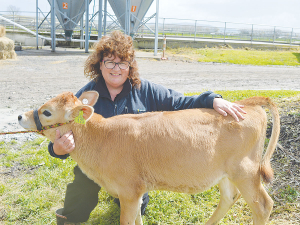Rural bias?
OPINION: After years of ever-worsening results from our education system, the startling results from a maths acceleration programme stood out like a dog’s proverbials – the trial producing gains of one full year in just 12-weeks.
 Ngatea farmer, Julie Pirie says students, who are from town and have no experience on a farm, come to the farm for five nights a week during the calving season.
Ngatea farmer, Julie Pirie says students, who are from town and have no experience on a farm, come to the farm for five nights a week during the calving season.
From August each year a special group of 'helpers' descend on Julie and Brian Pirie's farm at Ngatea in the Hauraki Plains.
They are primary school students from nearby Ngatea Primary School and until mid-October their job is to choose a pet calf, clean them, brush them and lead them around a special course.
In mid-October the calves are washed and taken by the students to the annual calf club day at school, where the calves and students compete in an obstacle course. They are also judged on leading, rearing and conformation. Ribbons and prizes are awarded to winning students.
Julie Pirie say between 10 and 15 students, who are from town and have no experience on a farm, come to the farm for five nights a week.
They end up competing with about 50 other students who come from farms around the district. The Piries milk 900 cows on a 274ha (eff) property.
Pirie had the idea to start her own calf club on farm around 15 years ago when she was serving as a trustee at the school.
"I heard that five students were pulled up for poor behaviour and their excuse was that they were bored and had nothing to do," she told Dairy News.
"I remember seeing an article about someone starting a calf club to keep students occupied. I thought, let's bring them to our farm."
She says the experience has been rewarding and she believes that the programme has been making a difference to the students.
"We've had children from disadvantaged backgrounds coming here, being given an opportunity to occupy themselves with an activity and then getting rewarded with ribbons on calf club days for their efforts in looking after the calves.
"It is boosting their self-esteem. For example, one girl feared calves when she first came out here, now she's right into it."
Calf club in New Zealand have been around for over 100 years ago. The earliest recording of a calf club event was in 1911 when the Boys and Girls Agricultural Group began in Otago. Pirie says the natural partnership of children and young animal was encouraged, as farmers recognised the benefits of children being responsible for training and caring for a young animal.
In regions around the country, the enthusiasm of farming parents, combined with local schools, gave life to calf clubs.
Today, many dairy farmers and their children look back with affection at the time they spent selecting, feeding and training calves for calf club and the events continue to be held each year in many rural schools and communities across New Zealand.
Global trade has been thrown into another bout of uncertainty following the overnight ruling by US Supreme Court, striking down President Donald Trump's decision to impose additional tariffs on trading partners.
Controls on the movement of fruit and vegetables in the Auckland suburb of Mt Roskill have been lifted.
Fonterra farmer shareholders and unit holders are in line for another payment in April.
Farmers are being encouraged to take a closer look at the refrigerants running inside their on-farm systems, as international and domestic pressure continues to build on high global warming potential (GWP) 400-series refrigerants.
As expected, Fonterra has lifted its 2025-26 forecast farmgate milk price mid-point to $9.50/kgMS.
Bovonic says a return on investment study has found its automated mastitis detection technology, QuadSense, is delivering financial, labour, and animal-health benefits on New Zealand dairy farms worth an estimated $29,547 per season.
OPINION: Staying with politics, with less than nine months to go before the general elections, there’s confusion in the Labour…
OPINION: Winston Peters' tirade against the free trade deal stitched with India may not be all political posturing by the…